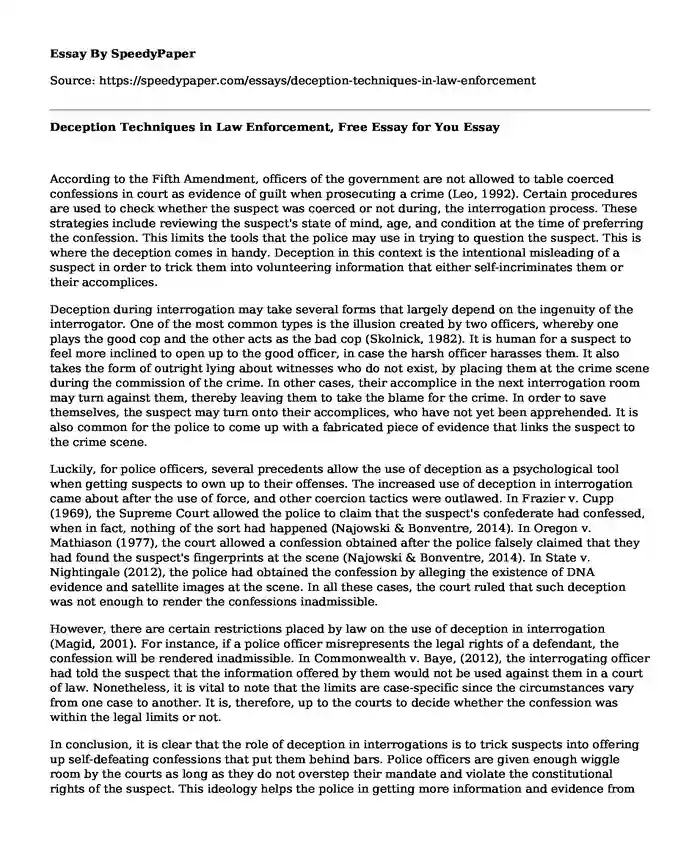According to the Fifth Amendment, officers of the government are not allowed to table coerced confessions in court as evidence of guilt when prosecuting a crime (Leo, 1992). Certain procedures are used to check whether the suspect was coerced or not during, the interrogation process. These strategies include reviewing the suspect's state of mind, age, and condition at the time of preferring the confession. This limits the tools that the police may use in trying to question the suspect. This is where the deception comes in handy. Deception in this context is the intentional misleading of a suspect in order to trick them into volunteering information that either self-incriminates them or their accomplices.
Deception during interrogation may take several forms that largely depend on the ingenuity of the interrogator. One of the most common types is the illusion created by two officers, whereby one plays the good cop and the other acts as the bad cop (Skolnick, 1982). It is human for a suspect to feel more inclined to open up to the good officer, in case the harsh officer harasses them. It also takes the form of outright lying about witnesses who do not exist, by placing them at the crime scene during the commission of the crime. In other cases, their accomplice in the next interrogation room may turn against them, thereby leaving them to take the blame for the crime. In order to save themselves, the suspect may turn onto their accomplices, who have not yet been apprehended. It is also common for the police to come up with a fabricated piece of evidence that links the suspect to the crime scene.
Luckily, for police officers, several precedents allow the use of deception as a psychological tool when getting suspects to own up to their offenses. The increased use of deception in interrogation came about after the use of force, and other coercion tactics were outlawed. In Frazier v. Cupp (1969), the Supreme Court allowed the police to claim that the suspect's confederate had confessed, when in fact, nothing of the sort had happened (Najowski & Bonventre, 2014). In Oregon v. Mathiason (1977), the court allowed a confession obtained after the police falsely claimed that they had found the suspect's fingerprints at the scene (Najowski & Bonventre, 2014). In State v. Nightingale (2012), the police had obtained the confession by alleging the existence of DNA evidence and satellite images at the scene. In all these cases, the court ruled that such deception was not enough to render the confessions inadmissible.
However, there are certain restrictions placed by law on the use of deception in interrogation (Magid, 2001). For instance, if a police officer misrepresents the legal rights of a defendant, the confession will be rendered inadmissible. In Commonwealth v. Baye, (2012), the interrogating officer had told the suspect that the information offered by them would not be used against them in a court of law. Nonetheless, it is vital to note that the limits are case-specific since the circumstances vary from one case to another. It is, therefore, up to the courts to decide whether the confession was within the legal limits or not.
In conclusion, it is clear that the role of deception in interrogations is to trick suspects into offering up self-defeating confessions that put them behind bars. Police officers are given enough wiggle room by the courts as long as they do not overstep their mandate and violate the constitutional rights of the suspect. This ideology helps the police in getting more information and evidence from the suspects for legal purposes.
References
Leo, R. A. (1992). From coercion to deception: The changing nature of police interrogation in America. Crime, Law and Social Change, 18(1-2), 35-59.
Magid, L. (2001). Deceptive police interrogation practices: How far is too far? Michigan Law Review, 99(5), 1168-1210.
Najowski, C. J & Bonventre, C. L. (2014). Deception in the interrogation room. American Psychological Association, 45(5), 26.Skolnick, J. H. (1982). Deception by police. Criminal Justice Ethics, 1(2), 40-54.
Cite this page
Deception Techniques in Law Enforcement, Free Essay for You. (2022, Apr 11). Retrieved from https://speedypaper.com/essays/deception-techniques-in-law-enforcement
Request Removal
If you are the original author of this essay and no longer wish to have it published on the SpeedyPaper website, please click below to request its removal:
- Free Essay Containing the Reference Letter for Chevening Award
- Essay Example on Fayol's Principles of Management
- Free Essay Sample on Personal Effectiveness
- Free Essay Example on Ron Popeil
- Free Essay Sample on Key Drivers of Global Business
- Terrorism Essay Example
- Why Nursing career became a choice
Popular categories





